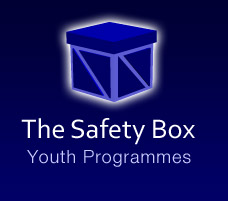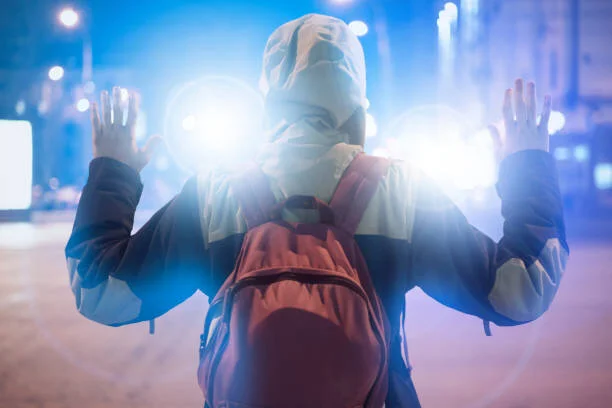By Shannon Jordan
As The Safety Box ® CIC blog writer, I have a duty to be knowledgeable and do research on varied topics, including gang violence and child criminal exploitation, but being knowledgeable or having an idea of something is not the same as experiencing it first hand. Personally, I’ve never been in a gang. Growing up in Tottenham, North London, I always heard of and saw incidences of gang involvement happening, however, I was a fairly sheltered kid. It was probably all around me without me even noticing. The signs were there, I was just too uninformed to know what they were at the time. My family kept me away from it, despite the area we grew up in. I have family members, friends, people I know well who have had experiences with gangs and the like, but I shunned it off, like many of us do.
We know the stories, we see the signs (most of the time), but we pass the responsibility off to someone else to deal with. We become detached, nonchalant, dismissive. We act as though it’s just another product of living in a marginalised area, or among a certain group of people when it isn’t. The rates might be higher in particular areas, yes, but it can happen to anyone. Any young person, or child, can easily get caught up in criminal exploitation without realising that it’s what they’re doing. They can easily be sucked into the status, and the protection, and the fear, without knowing that what they’re getting themselves into is dangerous. Why should they? Are we truly there to guide them, to prevent them from getting into these situations? Or are we behaving like it’s another situation that’s somebody else’s problem to deal with, dismissing the youth around us without realising? Because the truth is, whether they are young and being recruited, or they’ve been involved for a while and nobody has cared enough to help them get out, they are still young. They need our protection, safety, and support. They need the knowledge without the underlying judgement. They need the truth, and not just misinformed instructions to stay away.
So, with that said, this article is written for people like me. People who have just tidbits of knowledge, people who unknowingly “gave the problem” to someone else and want to do better, people who know youth involved in this but struggle with reaching them effectively.
What is Child Criminal Exploitation? The definition from the NSPCC states that it is “child abuse where children and young people are manipulated and coerced into committing crimes.” Gangs and criminal exploitation often go hand in hand. Nowadays the term “gang” can be used to describe anything from a organised ring of crime to a peer group of youth as friends, however the more well-known definition for a gang is “a group of young people who see themselves (and are seen by others) as a discernible group for whom crime and violence is integral to the group's identity.”
The reasons why a young person can join a gang are very diverse, ranging from wanting protection on the streets, to the status that it gives, to being recruited or groomed. Gangs can often provide a sense of family and community to the people in it, which can be appealing to the young person involved. The environment, personality and mental state of a young person has a large influence on their involvement in a gang, as things such as bullying or even being neurodivergent could possibly be a reason as to why they would become involved with gang activity. There may be times where individuals in gangs have felt that the gang was their only choice; either because they needed to keep themselves safe in the area they grew up in, or because they felt as though all other systems in their lives have given up on them, such as schools and the government.
Signs of gang recruitment or criminal exploitation could be difficult to spot, or mistaken for other things such as mental health issues if they aren’t looked at together with other recognised signs. These signs can include things such as being isolated or withdrawn, doing badly in school or getting lower grades, having items such as money, clothing or phones that aren't easily explained, becoming more angry or aggressive over time, or becoming involved with a different group of friends. Even things such as a sudden change in dress sense could be a sign. However, as previously mentioned, it is important not to rush to conclusions as many of these could be signs of another problem surfacing in a young person.
A large section of Child Criminal Exploitation involves county lines, which is the police term for the transportation of illegal drugs. Gangs often recruit or groom vulnerable youth to assist them as runners, exploiting them into carrying drugs from large towns and cities such as London or Birmingham into smaller towns, coastal areas or other markets where the demand is high. The youth could either be exploited into taking the drugs to certain places themselves, or to use a place close to them for bando- the term for the use of the homes of vulnerable adults or youth as a place to manufacture and sell food (the street term for drugs) from. Youth in these situations are usually highly vulnerable: often either with family or school issues, mental or learning difficulties, disabilities or dealing with bullying. These things can highlight a person's vulnerability, especially to those who want to exploit it. Criminal exploitation can be extremely dangerous on primary school children, even as young as 10 if not younger, who are highly at risk. They can often be approached by members of gangs with the proposition to engage in criminal activity, such as selling or transporting drugs, in exchange for things such as money, trainers, clothes, or phones.
Being involved in a gang or in criminal exploitation can have devastating consequences. A young person is at risk of being subject to threats and violence, emotional abuse, risking their safety and the safety of their loved ones, losing future prospects and job offers, being severely injured or killed and arrested with the possibility of jail time.
Often the most difficult part of gang experiences or criminal exploitation is finding the ability and courage to leave. For many young people, even if you want to leave, it can be very difficult to do so. Not only is the protection that it has given now become a backbone of a person’s daily life, but the connections made are difficult to break. The friends involved have now become like family, and the enemies made and associated with rival gangs are difficult to get away from. The dangers of being involved are paramount, however, the dangers of leaving are just as terrifying, especially when you think about the fact that there are influential people in gangs hoping for those they’ve exploited to be constantly present, and the dangers it could bring to the safety of that individual and their loved ones if they attempt to leave. However, wherever we can, we should do what we are able to in order to ensure that the youth are able to leave and stay safe without being in danger.
The Safety Box ® CIC works closely with youth who are currently or have been previously involved in gangs, and we have developed many programmes directed towards youth who have been in gangs, with the goal of providing them with skills, tools and self confidence to be able to see their future as achievable. We work closely with not only those involved in gangs, but also youth and children, teaching them about the signs and dangers of Child Criminal Exploitation, and showing them how to address issues without resorting to violence. Making the youth aware of the realities of carrying drugs, and distorting previous myths they may have heard, we bring the discussion to their engagement, empathising and understanding their issues, and reminding them that they are able to succeed and have faith in themselves and their abilities.
The stereotypes and ideas that are around gangs are true to an extent. All stereotypes come from some sort of truth. However, as I've become older and wiser, I’ve realised how much these stereotypes can harm our perception. Gangs were, and are, still common in the area I grew up in, and others like it, and they can have a lasting effect on the individuals involved, their close friends and families, and the community. Just like the effect they have is lasting, we need to make our understanding and support of the youth that come into it just as evident and realise that the perception needed to work with the youth involved is more than just knowledge of a stereotype. It involves us getting to their level, understanding their struggles, not dismissing them or bypassing them, but empathising with them and doing our best to make sure that they realise that their future has not ended there.




